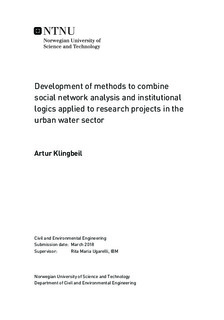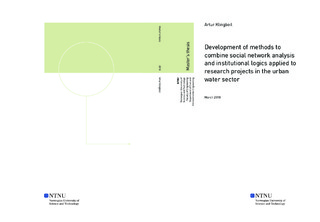| dc.description.abstract | Nowadays, a paradigm shift in the urban water sector is observable: while hierarchical governance structures were present in the past, many currently relevant challenges are characterized by a higher complexity, requiring novel approaches. Therefore, network governance, a term describing a coordination based on broad social participation instead of hierarchical orders, is gaining popularity. Similar to the change in governance structure, an altered approach is experienced in regard to institutional logics, a perspective describing the rationalities, values and actions of people. While the technically-oriented hydraulic logic has been dominating the urban water sector in the past, two alternative approaches are rising, namely the water market and water sensitive logics, being focused on the economic and the environmental aspects of water management, respectively. To understand how current and future challenges regarding climate change are being approached by researchers, different sociological concepts have to be united.
Founded on a literature-based enquiry, this thesis aims to develop methods in order to combine the two concepts of social network analysis and institutional logics. The developed methods are practically implemented in form of case study research, pursuing the goal to determine the extent of the paradigm change in two research networks. The application is focused on two cases: one research group based in Germany and another group from Norway, each working on current challenges in the urban water sector. Utilized methods include the assessment of project documentation and expert interviews. Moreover, a questionnaire is created and distributed in the research groups Klima 2050 (NOR) and KURAS (GER). The collected network data is analyzed and visualized using UCINET, whereas statistical analysis is performed with SPSS.
The final comparison of both research projects reveals striking similarities concerning both, the network characteristics as well as the distribution of institutional logics. Additionally, differences between both projects are examined. Conclusively, the benefit of the developed methods is evaluated, limitations are addressed, and future perspectives are proposed, considering the methods to provide a basis for the scientific community to pursue various studies on topics that have not been analytically linked before. | |

